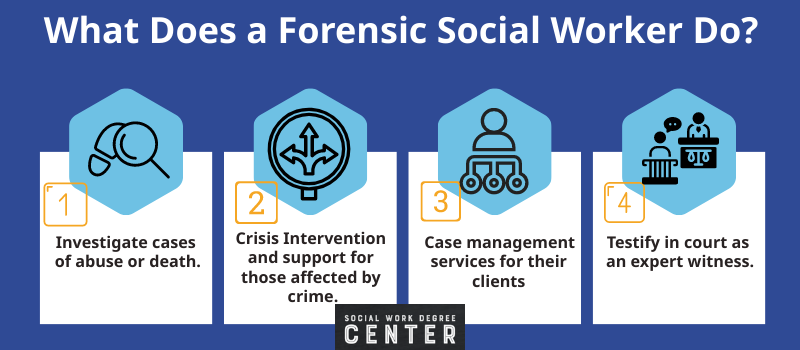The best Forensic Social Work masters programs equip professionals with specialized knowledge and skills to work at the intersection of social work and the criminal justice system, addressing issues such as crime prevention, rehabilitation, and support for individuals involved in legal processes.

What is the best Forensic Social Work masters program? These programs typically cover topics such as forensic assessment, criminal behavior, and the impact of legal policies on vulnerable populations, preparing graduates to make meaningful contributions within legal settings.
Methodology for Ranking the Best Forensic Social Work Masters Programs
The analytics team at Social Work Degree Center wants aspiring social workers and career-focused professionals to get the most out of their degrees. That’s why we focused our research on fully accredited, reputable social work programs offering excellent online options. Data comes from the National Center for Education Statistics, IPEDS, College Navigator, and each school’s website. For more on our methodology and the data sources for our rankings, visit our methodology page.
Methodology Sources:
- Price – IPEDS
- Reputation – Niche, U.S. News and World Report
- Salary Potential – College Scorecard
1. Long Island University

- Location: Brookville, NY
- Department: School of Health Professions
- Accreditation: CSWE Accredited
- Degree: MSW Forensic Social Work Concentration
- Credits: 60 credits
- Minimum Time to Completion: 24 months
- Enrollment Type: full time, part time
- Study Options: Traditional, Advanced Standing
- More Information: school website
The Long Island University Forensic Social Work degree program offers both full and part time options. This MSW program is campus based and offered at LIU’s Brooklyn and Brookville locations. Students in the MSW program take one additional course to fulfill the concentration. Graduates qualify for the Advanced Certificate in Forensic Social Work in New York state.
2. DePaul University

- Location: Chicago, IL
- Department: Department of Social Work
- Accreditation: CSWE Accredited
- Degree: MSW with a Forensic Social Work concentration
- Credits: 88 quarter credits
- Minimum Time to Completion: 24 months
- Enrollment Type: full time, part time, accelerated
- Study Options: Traditional and Advanced Standing
- More Information: school website
The Forensic Social Work concentration from DePaul University prepares you for practice and advocacy in settings where human services and the legal system intersect. This concentration provides students with focused knowledge and skills in the intersection of social work and the legal system. Students pursuing this concentration typically study topics related to the criminal justice system, legal processes, and the application of social work principles in forensic settings.
3. Aurora University

- Location: Aurora, Illinois
- Department: George Williams School of Social Work
- Accreditation: CSWE Accredited
- Degree: Online Master of Social Work with a Specialization in Forensic Social Work
- Credits: 27 to 60
- Minimum Time to Completion: 24 months
- Enrollment Type: online part-time and full-time
- Study Options: Traditional and Advanced Standing
- More Information: school website
Aurora University offers a comprehensive Forensic Social Work Masters program, equipping students with the knowledge and skills necessary for a career in the intersection of social work and the legal system. This specialized program emphasizes the application of social work principles in forensic settings, preparing graduates to address the unique challenges and complexities within the legal and criminal justice systems. With a focus on evidence-based practices and ethical considerations, Aurora University’s Forensic Social Work Masters program empowers students to make a meaningful impact in the field.
4. Seton Hall University

- Location: South Orange, NJ
- Department: School of Social Work
- Accreditation: Council on Social Work Education (CSWE)
- Degree: Master of Social Work (MSW) with a specialization in forensic social work
- Credits: 63 to 90
- Minimum Time to Completion: 24 months
- Study Options: Advanced Standing track, Regular Standing track
- More Information: school website
The advanced standing MSW program at Seton Hall University offers a specialization in forensic SW. This track equip students with the expertise to navigate the intersection of social work and the legal system. Through a combination of classroom instruction, hands-on experience, and field placements, Seton Hall’s MSW prepares graduates to address the complex issues at the crossroads of social work and the criminal justice system. With a focus on evidence-based practices and ethical considerations, graduates are well-prepared to make a positive impact in a variety of settings.
5. University of Tennessee at Knoxville

- Location: Knoxville, Tennessee
- Department: College of Social Work
- Accreditation: CSWE Accredited
- Degree: Master of Science in Social Work (MSSW) with a Forensic Social Work graduate certificate
- Credits: 36 + Certificate is 18 credit hours
- Minimum Time to Completion: 12 months full-time
- Enrollment Type: campus based, hybrid, online, part-time and full-time
- Study Options: Advanced Standing Program, Extended Study Program, Hybrid Evening Classes – Nashville
- More Information: school website
The University of Tennessee Knoxville offers a Master of Science in Social Work (MSSW) program with the option to obtain a graduate certificate in Forensic Social Work. This specialized program integrates core social work principles with a focus on understanding and addressing the challenges within the legal and criminal justice systems.
Students enrolled in the MSSW program have the opportunity to gain specialized knowledge and skills through the Forensic Social Work certificate, preparing them for careers that require expertise at the intersection of social work and the legal field. The combination of a comprehensive MSSW degree and a specialized certificate enhances graduates’ ability to contribute effectively in social work contexts.
6. The University of St. Francis

- Location: Joliet, IL
- Department: College of Social Work
- Degree: MSW with an Advanced Generalist Forensic Social Work Certificate (AGFSW Certificate)
- Accreditation: CSWE Accredited
- Credits: 32-62 for MSW + 14 credit hours for certificate
- Minimum Time to Completion: 12 months
- Enrollment Type: full-time, part-time
- Study Options: advanced standing (32) and standing (62)
- More Information: school website
The University of St. Francis offers a Master of Social Work (MSW) program complemented by a Forensic Social Work Post-Master Certificate. This combination provides students with an opportunity to delve into the specialized field after completing their MSW degree. The program equips social work professionals with the skills to navigate the unique challenges present in legal and forensic settings. Graduates of this program are well-prepared to apply their expertise in areas where social work intersects with the criminal justice system, making a meaningful impact in the field.
7. Alabama State University

- Location: Montgomery, Alabama
- Department: Department of Social Work
- Accreditation: CSWE Accredited
- Degree: Master of Social Work, Focus Area in Forensic Social Work
- Credits: 36 to 60
- Minimum Time to Completion: 12 months
- Enrollment Type: full-time, part-time
- Study Options: Advanced Standing (36) and Traditional (60)
- More Information: school website
The Master of Social Work (MSW) program at Alabama State University (ASU) offers a Focus Area in Forensic Social Work. Both the advanced standing and traditional track offer the 28 credit focus. ASU’s MSW program is a hybrid model and requires both online and in person classes.
8. Northern Kentucky University

- Location: Highland Heights, Kentucky
- Degree: MSW with a Forensic Social Work Micro Credential certificate
- Credits: MSW plus 3 courses online
- Minimum Time to Completion: 12 months
- Enrollment Type: part-time and full-time
- Study Options: Traditional program (60), Advanced Standing (36 credits)
- More Information: school website
The Northern Kentucky University micro-credential requires 3 courses and complements a social work degree as an area of specialization. Students with a MSW take Forensic Social Work and Social Work and the Law. And they can choose from either Addiction and Family Violence or Social Work in Law Enforcement Settings for the third online class.
9. The University of Utah

- Location: Salt Lake City, Utah
- Department: College of Social Work
- Accreditation: CSWE Accredited
- Degree: MSW with a Focus Area in Forensic SW
- Credits: 45 to 60 with 6 credits for focus area
- Minimum Time to Completion: 12 months
- Enrollment Type: part-time, full-time, evening and weekend, online, and at the Salt Lake campus
- Study Options: Advanced Standing (45) and Traditional (60)
- More Information: school website
The Forensic Social Work concentration at The University of Utah is available to campus based students. However, both traditional and advanced standing students can choose the 6 credit area of focus while studying at the Salt Lake campus.
10. The University of Maryland

- Location: Baltimore, MD
- Degree: Advance Certificate in Forensic Social Work
- Accreditation: CSWE Accredited
- Credits: 3 classes
- Minimum Time to Completion: 12 months
- Study Options: part-time and full-time
- More Information: school website
University of Maryland School of Social Work offers a certificate program that students can earn as they earn an MSW. The Advance Certificate in Forensic Social Work is the application of social work skills, knowledge and principles within the context of the legal system.
Two 3-credit classes are Social Work and the Law and Clinical Forensic Social Work. After completing the classes, students take a Seminar in Forensic Work, a Skills Lab: Testimony and Working with Attorneys and complete the program with working in a field or volunteer experience in a forensic setting. The Skills Lab consists of two full days of training on testifying in court and working effectively with lawyers.
What is Forensic Social Work?
Forensic social work is a specialized field within social work that focuses on the intersection of social work and the legal system. Professionals in this field, known as forensic social workers, apply their social work skills and knowledge to help individuals involved in legal matters, such as criminal or civil cases. Their primary goal is to address the social and psychological factors that may be relevant to legal issues and contribute to the overall well-being of the individuals they work with.
What is a Forensic Social Worker?
Social workers in this field apply their knowledge and skills to assist individuals involved in legal matters, such as court cases, criminal investigations, and other legal proceedings. The primary goal of forensic social work is to address social issues within the context of the legal system and promote justice, fairness, and well-being for individuals and communities.

What Does a Forensic Social Worker Do?
Forensic social work applies to many legal situations. The following are six of the most common responsibilities of forensic social workers.
- Investigate cases of abuse.
- Testify as an expert witness.
- Recommend rehabilitation or conflict resolution.
- Provide education and support regarding the outcomes of legal decisions.
- Mediate between individuals and groups.
- Provide evaluations of individuals to the courts or authorities.
How to Become a Forensic Social Worker
Becoming a forensic social worker typically involves a combination of education, experience, and specialized training. Forensic social workers work at the intersection of social work and the legal system, addressing crime, criminal justice, and the well-being of individuals involved in legal proceedings. Here are the general steps you might follow to become a forensic social worker:
Step 1: Education
Start by earning a bachelor’s degree in social work (BSW) or a related field such as sociology or psychology. Some social workers may also have degrees in criminal justice. While completing your undergraduate degree, try to gain relevant experience through internships, volunteer work, or entry-level positions in social work or criminal justice settings. A master’s degree in social work (MSW) is typically required for most forensic positions. Look for MSW programs that offer coursework or specializations in forensic SW, criminal justice, or related fields.
Step 2: Licensing
After completing your MSW, you must obtain a state license to practice social work. In some states, you can apply for a permit with a BSW degree. Licensing requirements vary by state, so check the regulations in the state where you plan to work. You’ll need to pass an exam and accumulate supervised clinical experience.
While only sometimes mandatory, obtaining certifications in forensic social work or related areas can enhance your credentials. Organizations like the National Association of Social Workers (NASW) may offer certifications or credentials specific to forensic social work.
Step 3: Gain Experience in Forensic Settings
Seek employment opportunities in forensic settings, such as correctional facilities, juvenile justice programs, legal aid organizations, or agencies that work with victims of crime. Working in the field will help you develop expertise and gain experience in victim advocacy, offender rehabilitation, family court, or child welfare. This will help you specialize in the forensic aspects of social work.
Step 4: Networking and Professional Development
Become a member of professional organizations related to social work, such as the NASW. Attend conferences and events to network with other professionals in the field. Stay informed and keep up-to-date with the latest developments in forensic social work by reading relevant literature, participating in training programs, and attending conferences or workshops.
Step 5: Specialize and Advance
Some forensic social workers pursue advanced certifications, additional training, or even a doctorate in social work (DSW or PhD) to enhance their expertise and open up opportunities for leadership roles or academia.
As you gain experience, you may choose to specialize further in forensic social work, focusing on areas such as domestic violence, child welfare, or substance abuse. The American Board of Clinical Social Work (ABCSW) offers a BCD certification in Forensic and Correctional Social Work.
Remember to check the specific requirements of the state or country where you plan to practice, as regulations can vary. Additionally, networking and building a solid professional reputation can be crucial in advancing your career in forensic social work.
What are the Admission Requirements for Forensic Social Work Master’s Programs?
Admission requirements for master’s programs in Forensic Social Work can vary slightly among different universities and colleges. However, there are common prerequisites and criteria that many programs typically look for. Keep in mind that it’s essential to check the specific requirements of the program you are interested in, as they may have unique criteria.
Here are some general admission requirements for Forensic Social Work Master’s Programs:
- Hold a bachelor’s degree from an accredited institution
- Have a minimum Grade Point Average (GPA) of 2.5 to 3.0 on a 4.0 scale, but competitive programs may have higher GPA requirements.
- Submit Letters of Recommendation from professors or employers
- A Personal Statement or Statement of Purpose outlining your career goals
- A current resume or CV detailing your academic and professional experiences
- An interview is part of the admissions process for some programs.
- Some programs prefer or require applicants to have relevant work or volunteer experience in social work or a related field. Experience in forensic settings or with populations involved in the criminal justice system can be particularly beneficial.
- Certain programs may have specific prerequisite courses or coursework requirements.
- Some programs may request GRE test scores from the Graduate Record Examination
It’s crucial to carefully review the admission requirements of each Forensic Social Work Master’s Program you are interested in, as they can vary. Contacting the program directly or checking their official website for the most up-to-date information is recommended.
What Kind of Courses Will You Take in a Forensic Social Work Master’s Program?
| Core Courses: | Social Work Practice: Foundations and Theories Human Behavior in the Social Environment Social Welfare Policy and Services Research Methods in Social Work |
| Concentration Courses: | Forensic Assessment and Intervention Legal and Ethical Issues in Forensic Social Work Trauma-Informed Practice in Forensic Settings Crisis Intervention and Management Substance Abuse and Addiction in Forensic Populations |
What Kind of Training Do Forensic Social Work Offer?
Practical training in forensic social work often involves a combination of classroom learning, fieldwork, and supervised experiences. Additionally, ongoing professional development is crucial to staying abreast of evolving legal and social work practices in this dynamic field.
Forensic social work involves applying social work principles and practices to legal settings. Professionals in this field work with individuals involved in the legal system, such as victims, offenders, and families, to address various issues and promote positive outcomes. Practical training in forensic social work encompasses a range of skills and activities.
| Forensic SW Practical Training | Description |
|---|---|
| Legal System Familiarization | Understanding the legal system, including court procedures, legal terminology, and the roles of various legal professionals. |
| Assessment and Evaluation | Conducting comprehensive assessments of individuals involved in legal processes, such as offenders, victims, or families, to understand their needs, risks, and strengths. |
| Crisis Intervention | Developing skills in providing immediate support and intervention during crises, such as assisting victims of crime or individuals facing legal challenges. |
| Case Management | Managing cases effectively, coordinating services, and advocating for clients within the legal system to ensure their needs are addressed. |
| Trauma-Informed Care | Integrating trauma-informed approaches when working with individuals who have experienced trauma, especially victims of crime. |
| Courtroom Testimony | Developing skills in providing expert testimony in court, if required, and effectively communicating social work findings to legal professionals. |
What are Challenges of Forensic Social Work?
Forensic social work involves addressing complex issues at the intersection of social work and the legal system. While this field can be rewarding, it also comes with its own set of challenges. Some of the common challenges faced by forensic social workers include:
Emotional and Traumatic Content
Dealing with trauma: Forensic social workers often work with individuals who have experienced trauma, including victims of crime, witnesses, or individuals involved in the criminal justice system. Managing the emotional impact of this trauma on both clients and themselves can be challenging.
Legal Complexity
Navigating legal processes: Forensic social workers need to have a solid understanding of legal procedures, court systems, and relevant laws. Navigating the complex legal landscape can be demanding and may require continuous learning to stay informed about changes in legislation.
Dual Loyalties
Balancing roles: Forensic social workers may face challenges in balancing their responsibilities to clients with their obligations to the legal system. Negotiating the sometimes conflicting interests of clients and the legal process can be ethically and emotionally challenging.
Heavy workload
Forensic social workers may have high caseloads and face time constraints, especially in settings like correctional facilities or agencies dealing with large numbers of clients. This can lead to burnout and stress.
Safety risks
Depending on the specific setting, forensic social workers may encounter safety risks, particularly when working in correctional facilities or with individuals involved in violent or criminal activities. Ensuring personal safety while providing effective services is crucial.
Limited or Scarce resources
Forensic social work settings, such as public defenders’ offices or community organizations, may operate with limited resources. This can impact the ability to provide comprehensive services and support to clients.
Stigma
Forensic social workers may face stigma associated with working in the criminal justice system. Public perceptions of individuals involved in legal matters and those working within the system can be negative, leading to challenges in building trust with clients and the community.
Family complexities
In cases involving child welfare or family court, forensic social workers often deal with intricate family dynamics, including issues of abuse, neglect, or custody disputes. Balancing the best interests of the child with legal requirements can be intricate.
Legal documentation
Forensic social workers are often required to maintain detailed and accurate records for legal purposes. Additionally, they may need to testify in court, which can be stressful and require effective communication skills.
Limited recognition
Forensic social work may not always receive the recognition it deserves, leading to challenges in advocating for the importance of social work in the legal context. This lack of recognition can affect funding, resources, and overall support for the profession.
Despite these challenges, forensic social work offers an opportunity to make a positive impact on individuals involved in the legal system and contribute to justice and social welfare. Building a supportive network, staying updated on best practices, and prioritizing self-care can help forensic social workers navigate these challenges effectively.
How Long Does it Take to Earn an MSW Degree?
The time it takes to complete a MSW depends on the type of program. Below is a breakdown of the time it typically takes for different types of MSW programs.
| Type of MSW | Credits | Full-Time | Part-Time |
|---|---|---|---|
| Traditional MSW | 60 to 70 | 2 years | 3 to 4 years |
| Advanced Standing MSW | 30 to 40 | 1 year | 2 to 3 years |
Traditional full-time MSW programs usually require around two years of study. Students typically complete a specified number of credit hours and fieldwork during this period. However, advanced standing programs are for individuals with a Bachelor of Social Work (BSW) degree from a program accredited by the Council on Social Work Education (CSWE). Advanced standing MSW programs are often shorter, taking around one year to complete.
Part-time MSW programs are available for individuals who prefer a more flexible schedule, often balancing work or other commitments. Part-time programs may take 3 to 4 years, depending on the number of courses taken each semester.
Online MSW programs may offer both full-time and part-time options. The duration of online programs can vary, but many are designed to accommodate working professionals and may take a similar amount of time as their on-campus counterparts.
Some MSW programs are part of a dual degree program. For example, an MSW/MPH is a dual degree in Master of Social Work and Master of Public Health. The completion time for dual degree programs may vary depending on the specific requirements of each program.
What is the Difference Between a Traditional MSW Program and an Advanced Standing MSW Program?
The main difference between a traditional Master of Social Work (MSW) program and an Advanced Standing MSW program lies in the entry requirements and the duration of the program.
| Topic | Traditional MSW | Advanced Standing MSW |
|---|---|---|
| Entry Requirements: | any bachelor’s degree | Bachelor of Social Work (BSW) |
| Duration of Program: | 2 to 4 years | 1 to 2 years |
| Coursework: | comprehensive | specialized |
| Internships: | yes | no |
| Fieldwork: | yes | yes |
What is the Job Outlook for a Forensic Social Worker?
The job outlook for forensic social workers is positive, with many growth opportunities. While the Bureau of Labor Statistics (BLS) doesn’t offer job growth projections specifically for forensic social workers, it projects all social work jobs will grow by 12% over the next decade. However, job outlook can vary based on location, economic conditions, and societal needs.
How Much Can You Make as a Forensic Social Worker?
How much does a forensic social worker earn? Salaries vary significantly based on geographic location, education, experience, and employer. Additionally, social workers with advanced degrees, such as a Master of Social Work or Doctorate in Social Work, and several years of experience tend to earn higher salaries.
According to the US Bureau of Labor Statistics (BLS), the median annual salary for social workers, in general, was around $55,350. However, forensic social workers may earn more, especially with additional education and experience.
Average Forensic Social Worker Salary
According to Salary.com, the median forensic social worker’s salary is $58,952, ranging from $47,252 to $71,932. ZipRecruiter reports the median Forensic Social Worker Salary is $78,890. Additionally, Payscale reports the average annual base salary is $47,349.
| Source | 25% | 50% | 75% | 90% |
|---|---|---|---|---|
| Salary.com | $52,828 | $58,952 | $65,746 | $71,932 |
| ZipRecruiter | $60,000 | $78,890 | $93,500 | $115,500 |
| Payscale | $42,000 | $47,349 | $61,000 | – |
Professional Organizations and Resources for Forensic Social Workers
- National Organization of Forensic Social Work (NOFSW)
- American Board of Forensic Social Workers (ABFSW)
- Association for Community Organization and Social Action (ACOSA)
- National Association of Social Workers (NASW)
Is a Career in Forensic Social Work Right for You?
Forensic social workers play a crucial role in the intersection of social work and the legal system. They may work in various settings, including law enforcement agencies, courts, correctional facilities, and mental health institutions. Their responsibilities often include assessing individuals involved in legal cases, supporting victims, and offering counseling or intervention services.
Sources:
- National Association of Forensic Counselors, Certifications Offered, Requirements
- National Organization of Forensic Social Work, Forensic Social Work
- National Organization of Forensic Social Work, Forensic Social Work Certificate
- PayScale, Average Forensic Social Worker Salary
- U.S. Bureau of Labor Statistics, Social Workers

